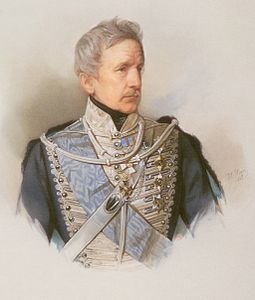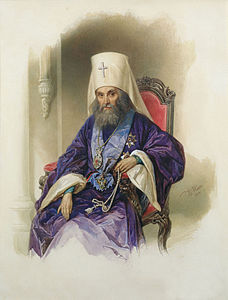Woldemar Hau (Russian: Владимир Иванович Гау, romanized: Vladimir Ivanovich Gau; 14 February [O.S. 4 February] 1816 – 23 March [O.S. 11 March] 1895) was a Baltic German watercolour painter best known for his portraits of Russian Imperial family and nobility, typical of the Biedermeier style.[1]
Woldemar Hau | |
|---|---|
| Владимир Гау | |
 Self-portrait (1855) | |
| Born | February 4, 1816 |
| Died | March 11, 1895 (aged 79) |
| Resting place | Smolensky Lutheran Cemetery, Saint Petersburg |
| Education | Member Academy of Arts (1849) |
| Alma mater | Imperial Academy of Arts (1836) |
| Known for | watercolor painting |
| Spouse |
Louise Sanftleben (m. 1842) |
Life and work
He was the son of painter Johannes Hau, who had emigrated from Northern Germany in 1795, and he grew up in the German community of Tallinn ("Reval" in German). His half-brother was the painter Eduard Hau. In addition to his father, he studied with the former Court Painter Karl von Kügelgen.
At age sixteen, he was offered an opportunity to paint the Grand Duchesses and received a letter of recommendation to Alexander Sauerweid, a Professor at the Imperial Academy of Arts. From 1833 to 1835 he was a "guest student" at the Academy.[1] He worked as a freelance painter for three years, then travelled extensively throughout Italy and Germany for two years. On his return, he was named Court Painter, spending the next three decades painting the Royal Family and their associates. He was appointed a member of the Academy in 1849.
Among his most famous works are his portraits of Tsar Nicholas I and the Tsarina Alexandra Fyodorovna. He eventually painted all the members of the Royal Family as well as many familiar figures in Russian and Baltic German society, such as Ferdinand Johann Wiedemann and Natalia Pushkina.[2] He also produced 200 miniature portraits of veterans of the Izmaylovsky Regiment.[1] He died on 23 March 1895 in Saint Petersburg.
Selected portraits
- Countess Yuliya Samoylova (1840)
- Grand Duchess Maria Nikolaevna and Her Children (1845)
- Peter von der Pahlen (1847)
- Count Nikolay Adlerberg (1847)
References
Further reading
External links
Wikiwand in your browser!
Seamless Wikipedia browsing. On steroids.
Every time you click a link to Wikipedia, Wiktionary or Wikiquote in your browser's search results, it will show the modern Wikiwand interface.
Wikiwand extension is a five stars, simple, with minimum permission required to keep your browsing private, safe and transparent.






